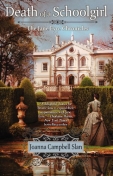BKMT READING GUIDES
Death of a Schoolgirl
by Joanna Campbell Slan
Kindle Edition : 0 pages
0 club reading this now
0 members have read this book
Introduction
In her classic tale, Charlotte Brontë introduced readers to the strong-willed and intelligent Jane Eyre. Picking up where Brontë left off, Jane's life has settled into a comfortable pattern: She and her beloved Edward Rochester are married and have an infant son. But Jane soon finds herself in the midst of new challenges and threats to those she loves?
Jane can?t help but fret when a letter arrives from Adèle Varens?Rochester's ward, currently at boarding school?warning that the girl's life is in jeopardy. Although it means leaving her young son and invalid husband, and despite never having been to a city of any size, Jane feels strongly compelled to go to London to ensure Adèle's safety.
But almost from the beginning, Jane's travels don?t go as planned'she is knocked about and robbed, and no one believes that the plain, unassuming Jane could indeed be the wife of a gentleman; even the school superintendent takes her for an errant new teacher. But most shocking to Jane is the discovery that Adèle's schoolmate has recently passed away under very suspicious circumstances, yet no one appears overly concerned. Taking advantage of the situation, Jane decides to pose as the missing instructor?and soon uncovers several unsavory secrets, which may very well make her the killer's next target?
Excerpt
“Here.” Cook poured from a teapot with a chipped spout, a delicate vessel on which pale roses had been painted, her chapped red hands thickly incongruous against the translucent white of the pot. She pressed a mug of lukewarm tea on me. I took a tentative sip. I wished it had milk and sugar, but I was grateful nonetheless. I closed my eyes to savor the brew. One more image impressed itself on my brain—a flapping sheet, the spectral silhouette I’d witnessed from the walkway. . I squeezed the thick mug, trying to transfer its warmth. I was cold, and hungry and tired. When the senses are over-stimulated, the imagination naturally attempts mediation, doesn’t it? I decided that my mind had taken my concern for Adèle, my guilt at not visiting, her fearful letter, my own memories of Lowood, and woven all these separate occurrences into a new and fantastical tale. Mixed together with the sight of a sheet flapping in the wind, I’d invented a dramatic intrigue. My mind had merely woven disparate visions together, hoping to create a narrative, even where none existed. That couldn’t have been a dead body that I had seen. Taken in tandem with the threat to Adèle, it conjured up all sorts of wild imaginings. Don’t go there, Jane, I warned myself. Keep to your plan. Surely Adèle is fine! Industry. I wanted motion and purpose to keep my emotions in check. I drained the mug. Before I could thank the cook, she took the cup from me and turned her back on me. “Hamburg. That’s a long way away, eh? You been running from someone. He done you harm, eh?” She had confused me with someone else. I opened my mouth to correct her, but before I could, she said, “No matter. Miss Miller will be happy to see you. Especially after what happened this morning. She is going to need all the help she can get, I’ll warrant.”Discussion Questions
In Charlotte Brontë’s original classic, Jane Eyre is a friendless orphan with no resources. By the conclusion of that book, she is an heiress with family ties as well as a husband and child. Discuss the changes this would naturally cause in a character. Can you see places in Death of a Schoolgirl where Jane resists these changes?“Accountability” is one of the issues raised in Death of a Schoolgirl. When we see or perceive a wrong, how much action must we take lest we are culpable? Although Death of a Schoolgirl was written before the scandal with Jerry Sandusky at Penn State, do you see parallels?
Over and over in Death of a Schoolgirl, Jane chooses to do what is right despite the costs to her or the danger. And yet, in the opening scene, Jane worries about protecting her son. This sets up tension that continues throughout the book, the push-pull of responsibility versus motherhood. Do you believe that a mother has a special obligation to avoid danger? Or to avoid risks? Why or why not?
Various characters with in this book have differing ideas about what makes a woman a good wife. Can you point out instances where characters voice their opinions? What do you think of these viewpoints? Do some of these notions carry over today in our society?
Book Club Recommendations
Recommended to book clubs by 0 of 0 members.
Book Club HQ to over 90,000+ book clubs and ready to welcome yours.
Get free weekly updates on top club picks, book giveaways, author events and more








